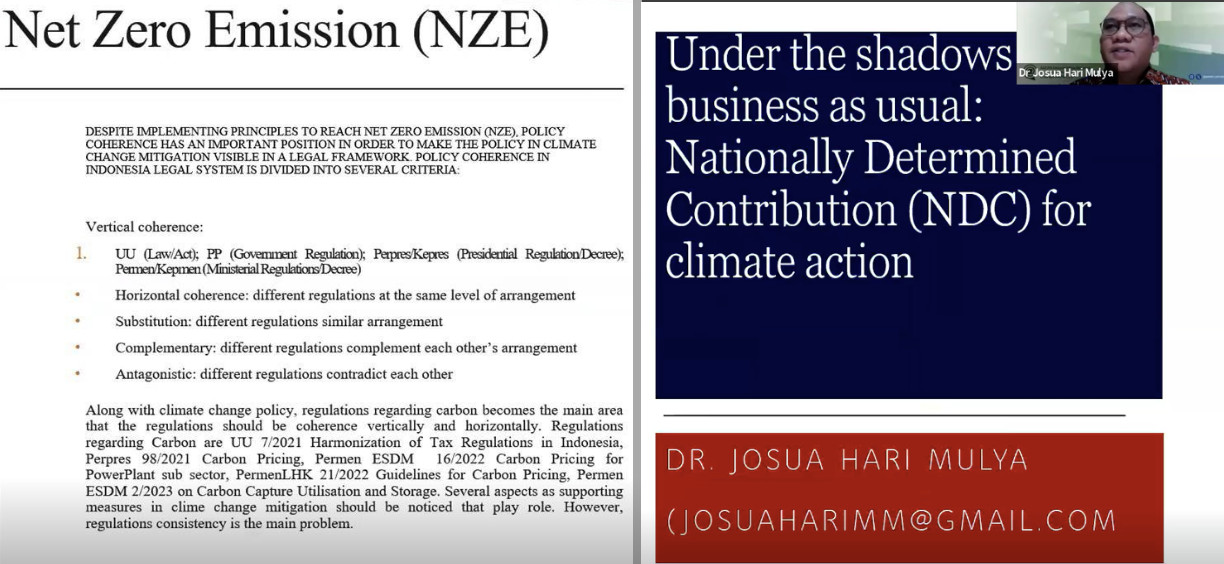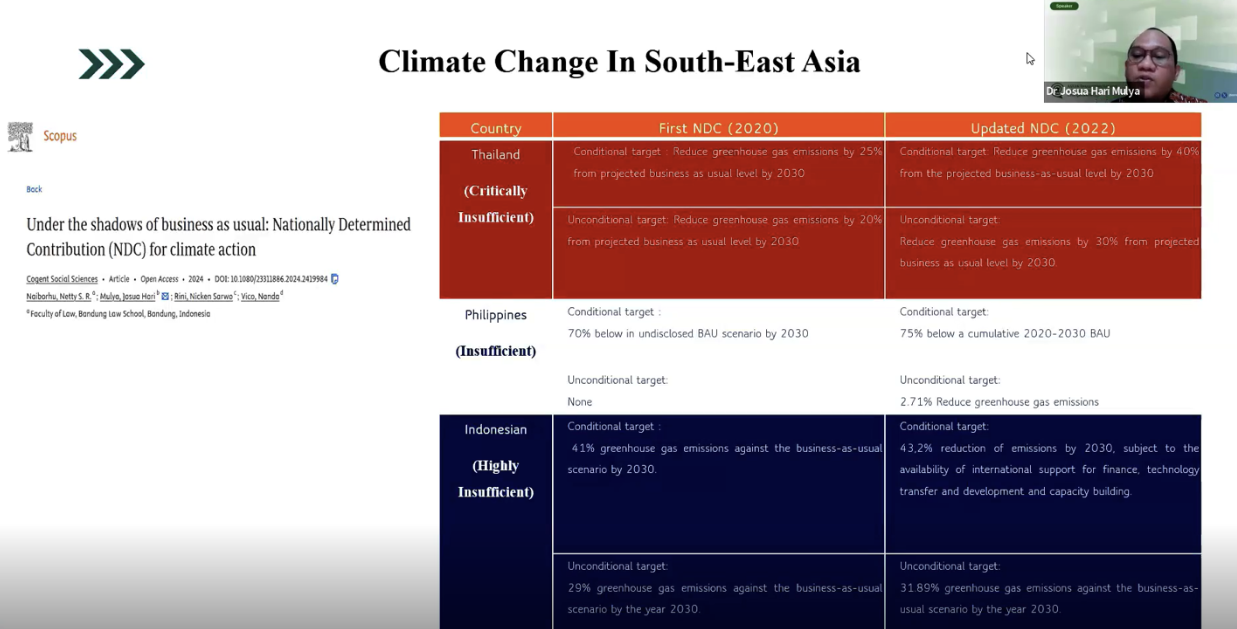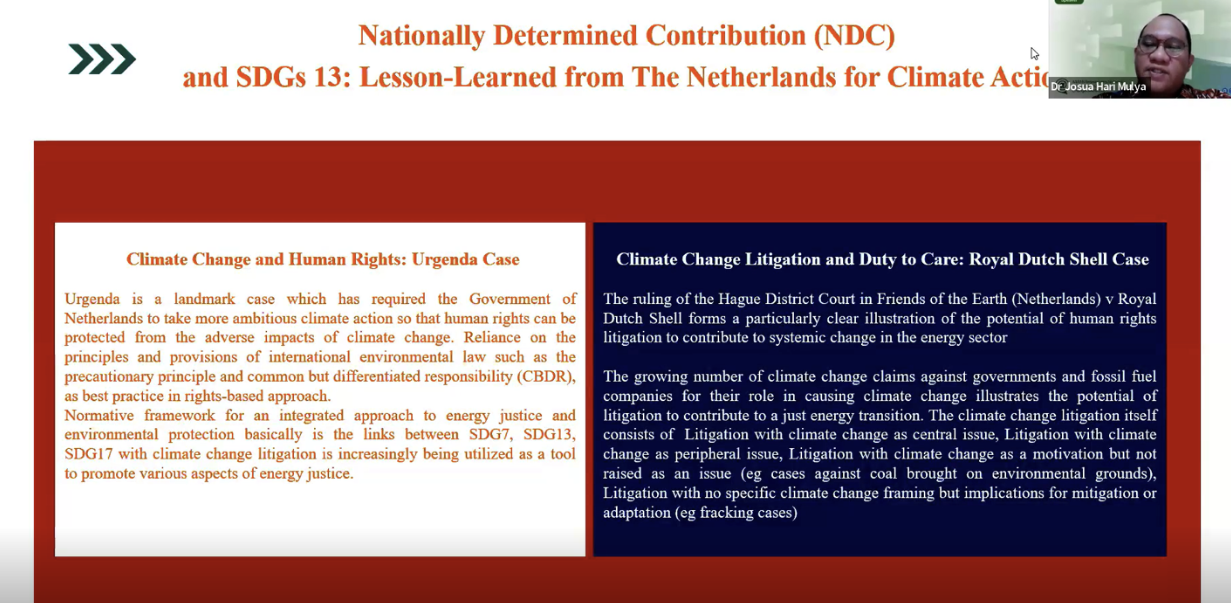Jakarta, 28 August 2025

Photo 1. Ms. Auliya Febriyanti from the ASEAN Centre for Energy along with Dr. Josua Hari Mulya at the second ARNECC Paper Talk
Jakarta, 28 August 2025 — An insightful session unfolded at the latest ASEAN Research Network on Energy and Climate Change (ARNECC) Paper Talk – NDC Series #2: Under the Shadows of Business as Usual: Nationally Determined Contribution (NDC) for Climate Action. Organised under the ASEAN Climate Change and Energy Project (ACCEPT) Phase II, the event gathered experts and stakeholders to explore Southeast Asia’s climate commitments. The session featured Dr. Josua Hari Mulya, a legal scholar and environmental law expert from Bandung Law School, known for his international experience in climate and human rights law.
The talk was led by Ms. Nathania Azalia, Research Assistant for ACCEPT II as Master of Ceremony, and moderated by Ms. Auliya Febriyanti, Junior Officer at the Modelling and Policy Planning Department of ACE.

Photo 2. (Left to right) Ms. Nathania Azalia, Research Assistant for ACCEPT II, leads the event as Master of Ceremony, and Ms. Auliya Febriyanti, Junior Officer at the Modelling and Policy Planning Department, moderates the discussion.
In his presentation, Dr. Josua Hari Mulya introduced his paper, “Under the Shadows of Business as Usual: Nationally Determined Contribution (NDC) for Climate Action.” He examined how the Philippines, Indonesia, and Thailand approach climate change through their national policies. He noted that despite different contexts and capacities, all three countries continue to rely on business-as-usual (BAU) strategies, revealing a gap between international commitments and domestic action. Dr. Josua emphasized that Southeast Asia’s climate future is constrained by overlapping economic priorities, political complexities, and fragmented legal frameworks. This situation underscors the urgent need for more inclusive and rights-based governance.

Photo 3. Dr. Josua Hari Mulya presents his paper titled, ”Under the Shadows of Business as Usual: Nationally Determined Contribution (NDC) for Climate Action”
Southeast Asia’s reliance on BAU strategies continues to hinder its progress toward meeting Paris Agreement targets. Countries like Indonesia, Thailand, and the Philippines have all made notable commitments, but they fall short when scrutinized against global benchmarks. Despite Indonesia’s increased NDC target, from 29% in 2016 to 43% in 2022 with international support, it remains categorized as “highly insufficient”, according to independent trackers. Thailand, though having raised its ambition, is rated as “critically insufficient”, while the Philippines, with its ambitious pledges but vague baselines, is labeled “insufficient”.

Photo 4. Dr. Josua reviews progress and impact of BAU strategies on Indonesia, Thailand, and the Philippines
Dr. Josua argued that unlocking the potential of sectors like geothermal requires not just technical investment, but legal certainty, particularly in forested areas where environmental protection and energy development must coexist. He called for clearer zoning regulations, parameter setting, and forest conservation strategies to avoid further policy contradictions.

Photo 5. Dr. Josua provides case study examples from the Netherlands
The conversation turned toward international law, where Dr. Josua drew comparisons between Southeast Asia and the European Union. He noted that while the Paris Agreement’s bottom-up approach gives developing countries the flexibility to set their own targets, its non-binding nature also limits enforceability. In this context, climate litigation, as seen in Europe, emerged as a powerful tool for accelerating policy reform. He encouraged ASEAN to consider this pathway, especially as non-governmental organisations (NGOs) and legal scholars increasingly advocate for stronger accountability and transparency mechanisms.
Participants also explored how renewable energy can double as a disaster risk mitigation strategy, especially as Southeast Asia faces intensifying climate hazards. Dr. Josua reiterated the need for enhanced technology, cross-border cooperation, and stronger institutions, stating that disaster preparedness must now be embedded into climate action plans.
Final Reflections: Moving Beyond BAU
Dr. Josua concluded that while the BAU approach may seem like a practical path for developing economies, it is ultimately inadequate and unsustainable. He called for bold, cross-sectoral reforms and local government empowerment as key to accelerating progress. ASEAN needs to shift toward transformative legal and policy frameworks that embrace complexity, align sectoral agendas, and prioritize both environmental and social equity.
(LL)
**
Join our ASEAN Researchers Network on Climate Change (ARNECC) by registering yourself here. Become a part of our collaborative efforts to address pressing climate challenges and shape a sustainable future.
Detailed information on ACCEPT II can be found at https://accept.aseanenergy.org/
Follow our social media to stay updated on ASEAN’s energy-climate nexus and ACCEPT activities.